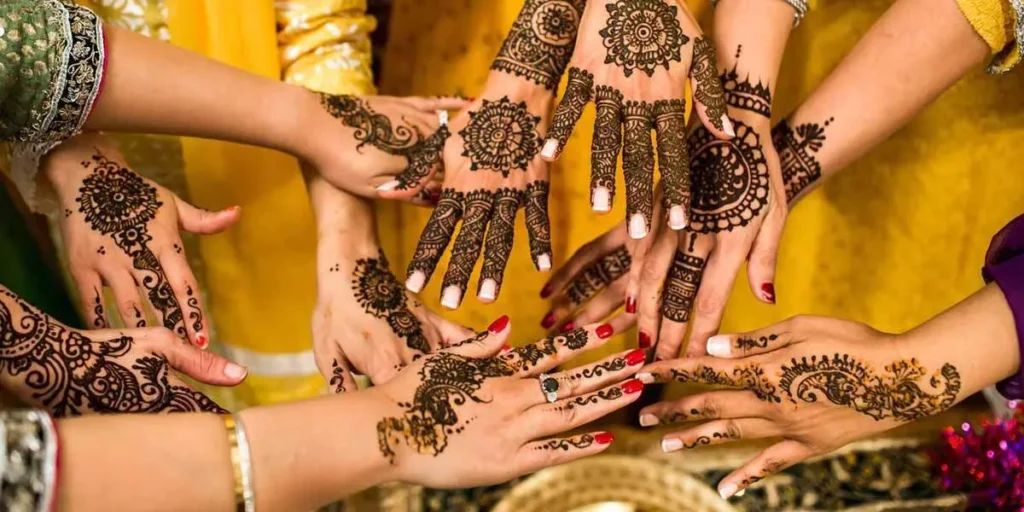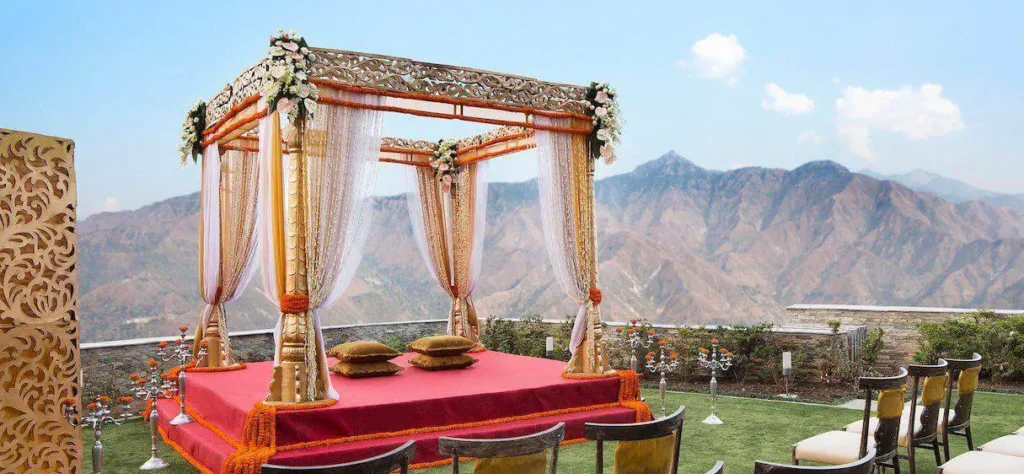In recent years, the landscape of wedding traditions in Kerala has experienced a remarkable transformation. The infusion of ceremonies such as mehndi, sangeet, and haldi, previously less prevalent, has become a defining feature of modern weddings. Over the past five years, this cultural shift has gained momentum, cutting across regional and communal boundaries.
Unlike a decade ago, when mehndi, sangeet, and haldi were synonymous with North Indian weddings, these rituals have permeated the mainstream in Kerala. Notably, the adoption of these vibrant ceremonies is not exclusive to any particular community; it is embraced by Hindus, Muslims, and Christians alike.
The metamorphosis witnessed in Kerala’s wedding customs is particularly evident within the Hindu community. Once unfamiliar with the extravagance of mehndi and the zest of sangeet, these elements have now become integral parts of their celebratory fabric. Moreover, the trend has transcended religious lines, with Muslim and Christian communities actively participating in and incorporating these lively celebrations into their weddings.

A decade ago, the incorporation of haldi, along with the introduction of mehndi and sangeet, was a rarity in Malayali weddings. However, evolving preferences and cross-cultural influences have ushered in a dynamic redefinition of wedding traditions. This shift not only adds depth to the cultural mosaic but also underscores the adaptability and openness of the community to diverse traditions.
Even within the traditionally rooted Kerala Muslim community, the mehndi ceremony has undergone a metamorphic evolution. What was once a customary practice has evolved into a distinctive and contemporary ritual, reflective of the changing times.
This cultural evolution underscores the fluidity of practices and the receptiveness of societies to reinterpret and integrate traditions. As this trend continues to gain momentum, weddings in Kerala are evolving into vibrant celebrations, weaving together customs from various corners of India, creating a more diverse and inclusive tapestry.

Mehandi Ceremony
A Mehndi party, integral to pre-wedding festivities in Hindu and Sikh cultures, symbolizes the adornment of the bride with a red-orange mehndi “stain” on her palms, the back of her hands, and her feet. This plant-based dye is artfully applied by the family and friends to symbolize the bride’s transformation into the epitome of bridal beauty.
India, a vast and culturally diverse country, mirrors this richness in its varied celebrations of the Mehndi ceremony. In North India, the event typically unfolds at the bride’s home, a joyous occasion where family and friends gather to commemorate the impending wedding. Contrastingly, South India witnesses a more intimate affair as the Mehndi ceremony takes place at the groom’s home, involving close family members and friends.
Gujarat and Rajasthan elevate the Mehndi ceremony to a grand spectacle. The bride and her family don traditional attire, while the Mehndi artist crafts intricate designs on the bride’s hands and feet. Maharashtra adds a unique touch with its “haldi-kumkum” ceremony during Mehndi, providing a platform for the women in the family to bestow blessings upon the soon-to-be-wed couple.

Traditional Haldi Ceremony
The Traditional Haldi Ceremony is a cherished pre-wedding ritual, known as Haldi Rasam, Tel-Baan, or Manjha, typically performed a day or two before the wedding day. During this heartwarming ceremony, family members and friends joyfully apply a paste composed of turmeric, oil, milk, and, in some traditions, sandalwood, rose water, and gram flour, on the bride and groom. This delightful ritual holds immense cultural significance and marks the commencement of the wedding festivities, standing prominently among other essential pre-wedding customs like Tilak.
Taking place on the morning of the wedding day at the respective residences of the bride and groom, the paste, incorporating turmeric, curd, sandalwood, and gram flour, is tenderly massaged onto their skin before a ceremonial bath. The rationale behind the profound importance of the Haldi ceremony in Indian weddings is multifaceted.
Firstly, turmeric holds deep-rooted auspicious significance in Hindu rituals, symbolizing purity, fertility, and good health. Its inclusion in various ceremonies reflects its sacred connotations.
Secondly, beyond its symbolic value, turmeric contributes to a divine glow, enhancing the bride and groom’s skin, ensuring they radiate freshness on their special day.
Moreover, the massaging of the turmeric paste onto the skin serves as a calming ritual, relieving tension and promoting relaxation. The antioxidant properties of curcumin, found in turmeric, act as a mild counter to anxiety and depression, fostering a serene state of mind.
The purifying nature of turmeric, both literal and symbolic, aligns with the idea of a new beginning, cleansing the body and soul as the couple embarks on their marital journey.
The association of the color yellow with new beginnings, peace, and happiness further enhances the significance of the Haldi ceremony. Yellow, considered auspicious after red in Indian culture, is embraced as the bride and groom don yellow attire during the ceremony, symbolizing an invitation to peace and prosperity in their married life.
Ultimately, the Haldi ceremony concludes with blessings from elders, preparing the couple for their upcoming nuptials and offering them a moment of relaxation and joy. This intimate affair, celebrated during the day, involves close family members and friends, making it a cherished and culturally rich tradition in Indian weddings.

Sangeet Ceremony
The term “sangeet,” derived from Sanskrit meaning “sung together,” encapsulates a vibrant pre-wedding ceremony deeply rooted in Punjabi and North Indian traditions. This festive event is characterized by lively dancing and celebratory songs, marking the commencement of the joyous wedding celebrations.
The Sangeet stands out among the multitude of pre-wedding events preceding Hindu, Punjabi, and Gujurati wedding ceremonies. Translating to ‘sung together’ in Sanskrit, the term ‘gaun,’ signifying ‘songs’ or ‘to sing’ in Hindi, succinctly captures the essence of this celebration. Originating in the Punjab regions of India, the Sangeet has evolved into a widely embraced form of pre-wedding revelry, adopted by many other regions as a joyful precursor to the impending nuptials.
Traditionally a female-centric gathering from both sides of the family, the Sangeet has evolved with modern times, welcoming men to partake in the festivities. Unlike religious ceremonies like Haldi or certain parts of the wedding ceremony, the Sangeet is exclusively designed to revel in the happiness and joy surrounding the couple.
In its historical context, the Sangeet was an elaborate affair spanning ten days, leading up to the wedding day. However, practical considerations condensed this spirited tradition into a one-day function, strategically positioned two or three days before the wedding, preceding the Mehndi ceremony. This celebration entails dances performed by relatives and friends of the bride and groom, songs sung in unison by elder female family members, and an open dance floor to set the tone for the upcoming festivities.
Held at the bride’s home or a designated banquet hall, the Sangeet is not just a musical and dance extravaganza but also a social bonding experience. The bride’s family welcomes the groom’s family with traditional folk songs like Suhaag, set to the lively beat of the Dhol.
The heart of the Sangeet lies in the communal singing of traditional songs related to the bride and groom, guided by the elders, particularly prevalent in Punjabi culture. These songs often include humorous anecdotes about in-laws, the bride leaving her parents’ home, and insights into maintaining a successful marriage.
Beyond mere rejoicing, the Sangeet serves the crucial purpose of bringing families together, fostering familiarity before the grand wedding day. Friends and relatives of the bride and groom add to the jubilation by choreographing dance numbers, creating a social bond that connects the two families and strengthens their ties to the soon-to-be-wed couple.
For a seamless Sangeet experience, consider exploring Indian Wedding DJs who specialize in hosting this dynamic celebration, ensuring a memorable and joyous occasion for all involved.

Destination Weddings in Kerala
The allure of destination weddings in Kerala has been on the rise, captivating the hearts of Malayalee people and attracting North Indian as well as foreign couples. Cities like Kochi, Trivandrum, Alappuzha, and Thrissur have become prime locations for these enchanting celebrations. The captivating landscapes of Kerala, characterized by lush greenery and picturesque backdrops, hold a particular fascination for North Indians and foreigners alike.
The infusion of North Indian wedding traditions, such as the vibrant sangeet, haldi, and mehndi ceremonies, has become an integral part of weddings in Kerala. These lively and colorful rituals have added a unique flavor to the traditional Malayalee weddings, creating a blend of cultural richness and diversity.
In the captivating locales of Kerala, destination weddings are not limited to locals but have also become a favorite choice for couples from different parts of India and around the world. The popularity of destination weddings is not only attributed to the scenic beauty but also to the expertise offered by experienced wedding planners.
Jaspira Wedding Planners, with their seasoned proficiency in wedding planning, have become synonymous with creating unforgettable events. Their meticulous planning and execution ensure that every aspect of the wedding, including the essential sangeet, haldi, and mehndi ceremonies, is seamlessly integrated into the celebration.
The team at Jaspira understands the significance of these ceremonies in adding vibrancy and joy to the wedding festivities. Whether you envision a traditional Malayalee wedding or a fusion celebration that incorporates diverse cultural elements, Jaspira is ready to transform your dreams into a breathtaking reality.
As you embark on this journey of love and celebration, Jaspira invites you to entrust them with the responsibility of curating a truly special wedding event for you. Their commitment to creating beauty and magic on your wedding day is evident in every detail they meticulously plan. Contact Jaspira Wedding Planners to embark on the path to a stunning and memorable destination wedding in Kerala.
